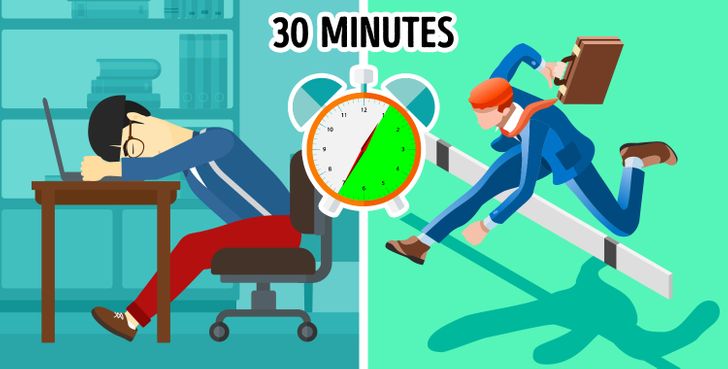A quick nap in some cultures is considered a sign of laziness, while in other cultures, such as Japan, it is considered a sign of hard work. Whatever your beliefs, we’ve all experienced that taking a power nap is refreshing and increases our mental alertness, and even science recommends doing so.
To help you decide how much time to take naps and what the associated benefits are, We present you with a quick guide to napping.
10-20 Minutes: For A Quick Boost Of Alertness

According to experts, a 10-20 minute nap offers the best return on your investment. It is ideal for increasing alertness and increasing energy levels. The short duration of an invigorating nap is designed to prevent naps from falling into a deep sleep. This allows you to start running, right after waking up.
But, as we all know, waking up after tasting the sweet taste is difficult, which is why it is recommended to do it sitting a little upright. Also, take it after lunch, around 3 or 4 PM, It will help stave off junk food cravings and reduce stress hormones that cause the body to retain weight, helping to lose weight.
30 Minutes: To Say Goodbye To Fatigue

While taking a 30-minute nap can make rest even more difficult, the benefits it brings are worth the pain. This short nap has been shown to improve memory function, reduce stress, increase concentration, lower the risk of diabetes, and prevent dementia.
Experts say that you will be better off taking a 30-minute nap in the middle of the day, as the body and brain, after being awake for 7 to 8 hours, need to rejuvenate.
60 Minutes: For Cognitive Memory Processing

If your job involves a lot of mental activity, this might be the perfect length of a nap. With an hour of sleep, you also sleep soundly, which helps unblock your brain and increase your cognitive abilities, as well as your ability to remember facts and figures.
It also helps fight frustration. However, on the other hand, sleeping soundly will mean that you will wake up a little dizzy and will have to spend some time recovering.
90 Minutes: Full Sleep Cycle

This is a complete sleep that includes the stages of light and deep sleep. You may also experience REM (rapid eye movement), a stage related to dreams. According to sleep researcher Dr. Sara Mednick, a 90-minute nap is beneficial for physical and mental health.
It also improves memory and increases creativity. And the best part is, it’s easier to wake up from that nap without feeling dizzy.
Benefits Of Napping

- Significantly reduces the risk of heart-related death.
- Reduces cardiovascular stress.
- Lowers blood pressure.
- Reduces the risk of diabetes.
- Helps to lose weight.
- Prevents dementia.
So what is the best nap for you? Do you usually take a nap during the day? Let us know what you think in the comments below!


